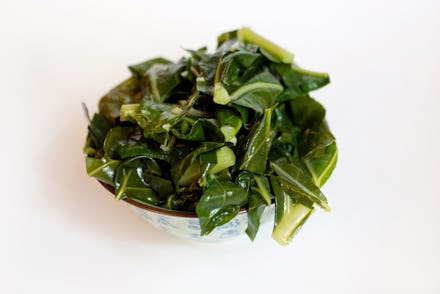Whole Foods Told People to Put Peanuts in Collard Greens, and Black Twitter Wasn't Happy

The difference between traditional collard greens recipes and Whole Foods' new suggestion is, well, peanuts.
No, really — the supermarket chain suggested to its almost 5 million Twitter followers on Thursday that they add peanuts to their collard greens, with this tweet:
Puzzlingly considering the image choice, the article that this tweet leads to does not have any recipes that include peanuts.
Black Twitter had a few words for Whole Foods after the tweet went up Thursday morning. To sum it up: swerve.
Oh yes, there were video responses, too.
Some even called out the grocery chain for the gentrification of a traditional African-American dish.
But these Twitter users weren't the first to target Whole Foods for its marketing of culturally aligned foods.
After Whole Foods published a blog in January 2014 calling collard greens "the new kale," feminist writer Mikki Kendall reacted by starting the hashtag #foodgentrification, which she wrote about for the Grio. Following Kendall's post, Bitch published a piece by chef Soleil Ho titled "#FoodGentrification and Rebranding of Traditional Foods," and a subsequent story two months later called "The Cost of Kale: How Foodie Trends Hurt Low-Income Families." Some people have pushed back on the concept of food gentrification, but as Whole Foods' recent tweets have shown, it can still get companies into trouble.
However, culinary historian and TED fellow Michael Twitty, who previously told Mic about the history of Thanksgiving dinner, tweeted that, though it's not exactly a Black Twitter crowd-pleaser, the idea of putting peanuts in collard greens is ideologically sound.
Twitty retweeted an African recipe for greens in groundnut, or peanut, sauce.
Regardless of what you think about collard greens and peanuts, Whole Foods did apologize for its mistake with a stock image tweet a few hours later.